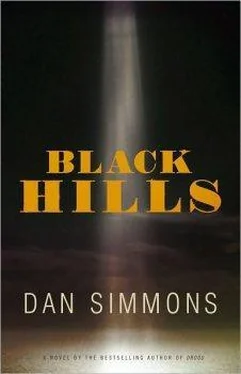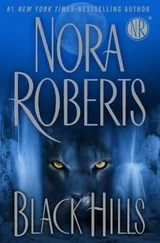The old men
say
the earth
only
endures.
You spoke
truly.
You are right.
It sounded good. If he thought of nothing else between here and the battlefield only some fifteen miles south, he might try chanting that in his last seconds.
But now he whispered to the ghost—
— Not yet. I’ll think of something.
The ghost’s reply was low and—Paha Sapa realized to his surprise—serious.
“Next to ‘Garry Owen,’ I was always partial to ‘The Girl I Left Behind Me.’ I had the regimental band play it the day we rode out from Fort Abraham Lincoln that last time. It always made some of the troopers and all of the watching, waving wives blubber.”
— Let me get this straight, Long Hair. You want me to chant “The Girl I Left Behind Me” as my Death Song?
“Why not? It sort of applies to both of us, although Rain left you behind rather than the other way around. I left Libbie behind—we both knew it could happen, although I don’t think either one of us really believed it—but she never abandoned me. All those years alone as a widow… ”
Paha Sapa was in a good mood from the giant breakfast—certainly the best breakfast he’d eaten since Rain had died—and he didn’t want it spoiled by morose thoughts, his or his ghost’s.
— Well, I don’t have a regimental band with me today, so I don’t think I’ll try “The Girl I Left Behind Me.”
Then, without thinking about it, he whispered—
— Are you frightened, Long Hair?
Paha Sapa half-expected the irritating boyish laughter, but it did not come.
“Of the bullet in the brain… your brain… no. Not at all. But since you asked, what I’m frightened of is that this magic forty-five-caliber bullet might put you out of your misery forever but won’t kill me —since I am, after all, only a ghost. Imagine still being conscious and thinking and aware, through what’s left of your senses, after they bury your dead and rotting body in the ground… down there in the darkness and loam, with the worms, for how long until the last of your brain is consumed and…”
— All right, all right. Do you want me to leave a note asking that my remains be cremated?
Paha Sapa meant it as a joke, although he was feeling a little ill after the helpful cascade of images, but Long Hair’s ghost evidently took him seriously.
“I’d appreciate it, my friend.”
Paha Sapa shook his head, noticed that other men in other booths had noticed him whispering to himself, left a very large tip, paid his check, and went back to the restroom—the first indoor plumbing he’d had at his disposal in many, many weeks (his shack in Keystone had an outhouse) and a great luxury.
“A hearty bowel movement for the condemned man.”
— Oh , do shut the hell up. I beseech you.
Paha Sapa thought that he had never used the word beseech aloud before, and he felt ridiculous doing so then. But the ghost of General (Colonel at the time of his death) George Armstrong Custer did shut up long enough for Paha Sapa to enjoy the miracle of indoor plumbing.
The restroom was very clean.

IT IS LATE MORNING when he turns off Highway 87—a modern two-lane highway busy with trucks and dark cars—back onto the gravel road he took from Busby. The entrance to the battlefield park runs off to the right of this smaller road. There is a sort of gate at the entrance to the park or monument or whatever it’s become, but no one is there, and Paha Sapa is relieved at that. He spent enough of his life’s savings on the huge breakfast.
Paha Sapa has almost no sense of recogntion as he rides his son’s motorcycle down the narrow strip of road along the ridge where Custer died. Below is the Greasy Grass—what wasichus still call the Little Big Horn—and he can see the giant cottonwoods where the hundreds of lodges of the Sioux and Cheyenne had stretched out of sight around the bend in the valley to the south.
The ghost’s self-imposed silence has not lasted long.
“I do have one regret.”
— Other than getting yourself and a third of your regiment killed, you mean?
Paha Sapa feels sorry he’s thought that even as he thinks it. It’s too late in the game, as the Mount Rushmore workers and baseball players might say, for petty jibes.
The ghost doesn’t seem to have heard.
“I just wish I’d had a chance to drive—ride—whatever you do—this motorcycle you and your boy rebuilt. I rode a bicycle once, but it’s not the same.”
Paha Sapa has to chuckle.
— I can see the whole Seventh Cavalry on Harley-Davidsons.
“We’d need leather jackets. And some sort of new insignia.”
— Skulls, perhaps.
They arrive at what a small sign announces as last stand hill. Paha Sapa parks the motorcycle and starts to take the valise with him but then thinks better of it. He’s put the Colt into a canvas bag with a shoulder strap, but he leaves that in the valise. This isn’t the place. There are three cars parked here: two old Fords and a fancier Chevrolet. He sees a few people in summer linens moving among the white crosses and headstones on the grassy hillside.
Paha Sapa stops at a stone monument put up not long after the battle here. The names of the Seventh Cavalry dead are listed on a bronze plaque burnished gold by age and touch.
“Are we tourists today, Mr. Paha Sapa?”
— I thought you might want to see where you fell.
“I don’t, especially. Besides, my bones aren’t buried there. They moved me to West Point. Libbie’s buried there next to me.”
Paha Sapa looks down across the hillside, opening his vision to the ghost within him. The headstones, not all with names, were set where the men’s mutilated bodies were found and buried where they fell.
Why did he ride up the couloir onto the bluffs with the warriors that day? He can’t really remember. To count coup? Why? As a young wikasa wakan in training, he hadn’t even cared about such things… or so he’d thought.
Paha Sapa goes back to the motorcycle and drives south along the ridgetop, the gravel road barely wider than a walking path. There are no other cars here beyond Last Stand Hill. In ten minutes, the slowly moving motorcycle covers the three or four miles that separated Custer and his men from the rest of the Seventh Cavalry—and rescue. But Reno and Benteen didn’t attempt a rescue, Paha Sapa knows; they merely listened to the shooting go on and on to the north and then, horribly, fall silent. They had their own problems to deal with.
A little sign by a walking path says weir’s ATTEM TO RESC E C TER. Someone has shot the missing letters out with a high-power rifle. Paha Sapa drives on to a gravel parking area where an intact sign reads reno and benteen monument and battlefield.
The ghost’s whisper is almost inaudible even coming from inside Paha Sapa’s head.
“Libbie fought until she died to keep Reno from having a monument or mention anywhere on the battlefield. As soon as she died, they gave him one.”
— Do you care?
“No.”
This time, Paha Sapa leaves the gladstone in the sidecar but takes the canvas bag, hitching the strap easily over his shoulder. In the bag is some bread, bologna, and the loaded Colt.
He walks across the broad crown of the hill toward the cliffs and valley.
“You’re hurting terribly, aren’t you, Black Hills?”
Paha Sapa considers not answering but decides he will. What harm can it do now?
Читать дальше













